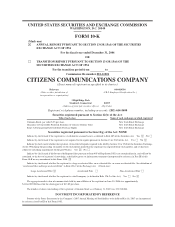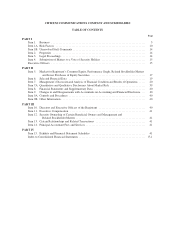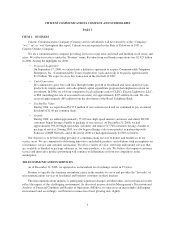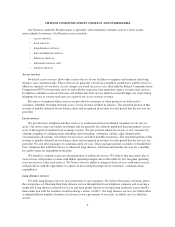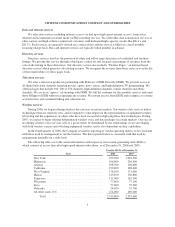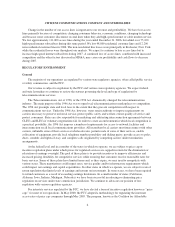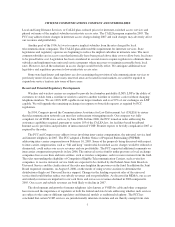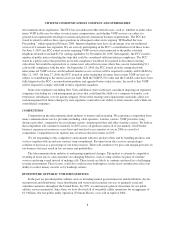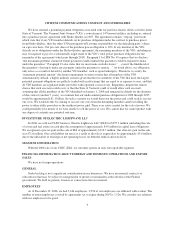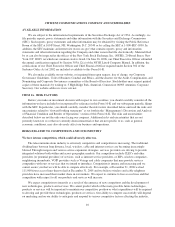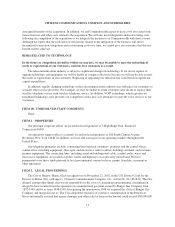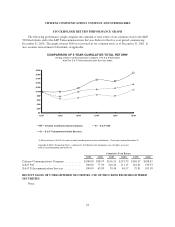Frontier Communications 2006 Annual Report Download - page 9
Download and view the complete annual report
Please find page 9 of the 2006 Frontier Communications annual report below. You can navigate through the pages in the report by either clicking on the pages listed below, or by using the keyword search tool below to find specific information within the annual report.CITIZENS COMMUNICATIONS COMPANY AND SUBSIDIARIES
telecommunications regulations. The FCC has not addressed other related issues, such as: whether or under what
terms VOIP traffic may be subject to intercarrier compensation; and whether VOIP services are subject to
general state requirements relating to taxation and general commercial business requirements. The FCC has
stated its intent to address these open questions in subsequent orders in its ongoing “IP-Enabled Services
Proceeding,” which opened in February 2004. Internet telephony may have an advantage over our traditional
services if it remains less regulated. We are actively participating in the FCC’s consideration of all these issues.
On June 3, 2005, the FCC issued an order requiring VOIP services interconnected to the public switched
telephone network to include E-911 calling capabilities by November 28, 2005. Subsequently, the FCC issued a
number of public notices detailing the steps that could be considered sufficient interim compliance. The FCC
stated in a public notice that providers not in full compliance would not be required to disconnect existing
subscribers but would be expected not to connect new subscribers in areas where they are not transmitting 911
calls in full compliance with the rules. On September 23, 2005, the FCC issued an order stating that both
interconnected VOIP services and broadband internet access services will be required to comply with CALEA by
May 12, 2007. On June 27, 2006, the FCC issued an order stating that revenues from certain VOIP services are
subject to contributing to the universal service fund. Both the VOIP E-911 order and the CALEA order have been
fully litigated in the FCC’s reconsideration petition and appealed before federal courts; the result is that VOIP
will be required to comply with both of these regulatory mandates.
Some state regulators (including New York and Illinois) have in the past considered imposing on regulated
companies (including us) cash management practices that could limit the ability of a company to transfer cash
between its subsidiaries or to its parent company. None of the existing state requirements materially affect our
cash management but future changes by state regulators could affect our ability to freely transfer cash within our
consolidated companies.
COMPETITION
Competition in the telecommunications industry is intense and increasing. We experience competition from
many communications service providers including cable operators, wireless carriers, VOIP providers, long
distance providers, competitive local exchange carriers, internet providers and other wireline carriers. We believe
that competition will continue to intensify in 2007 across all products and in all of our markets. Our Frontier
business experienced erosion in access lines and switched access minutes of use in 2006 as a result of
competition. Competition in our markets may result in reduced revenues in 2007.
We are responding to this competitive environment with new product offers and by bundling products and
services together with an end user contract term commitment. Revenues from data services and packages
continue to increase as a percentage of our total revenues. There will continue to be price and margin pressures in
our business that may result in less revenues and profitability.
The telecommunications industry is undergoing significant changes. The market is extremely competitive,
resulting in lower prices, and consumers are changing behavior, such as using wireless in place of wireline
services and using e-mail instead of making calls. These trends are likely to continue and result in a challenging
revenue environment. These factors could also result in more bankruptcies in the sector and therefore affect our
ability to collect money owed to us by bankrupt carriers.
DIVESTITURE OF PUBLIC UTILITIES SERVICES
In the past we provided public utilities services including natural gas transmission and distribution, electric
transmission and distribution, water distribution and wastewater treatment services to primarily rural and
suburban customers throughout the United States. In 1999, we announced a plan of divestiture for our public
utilities services properties. Since then, we have divested all of our public utility operations for an aggregate of
$1.9 billion. Our last public utility operation (Vermont Electric) was sold in April of 2004.
8


